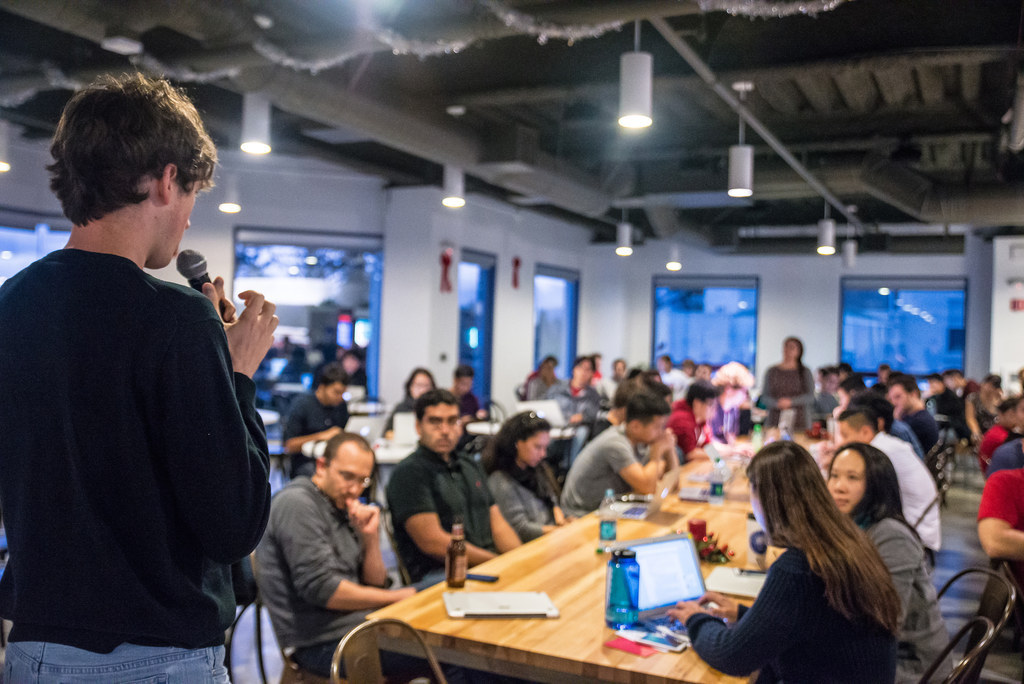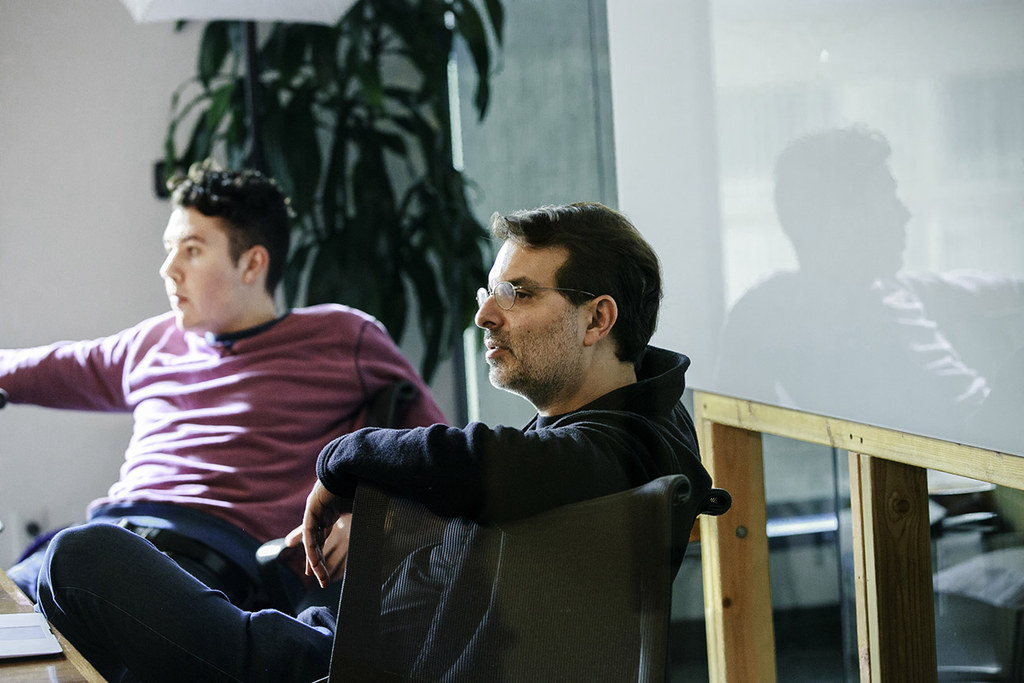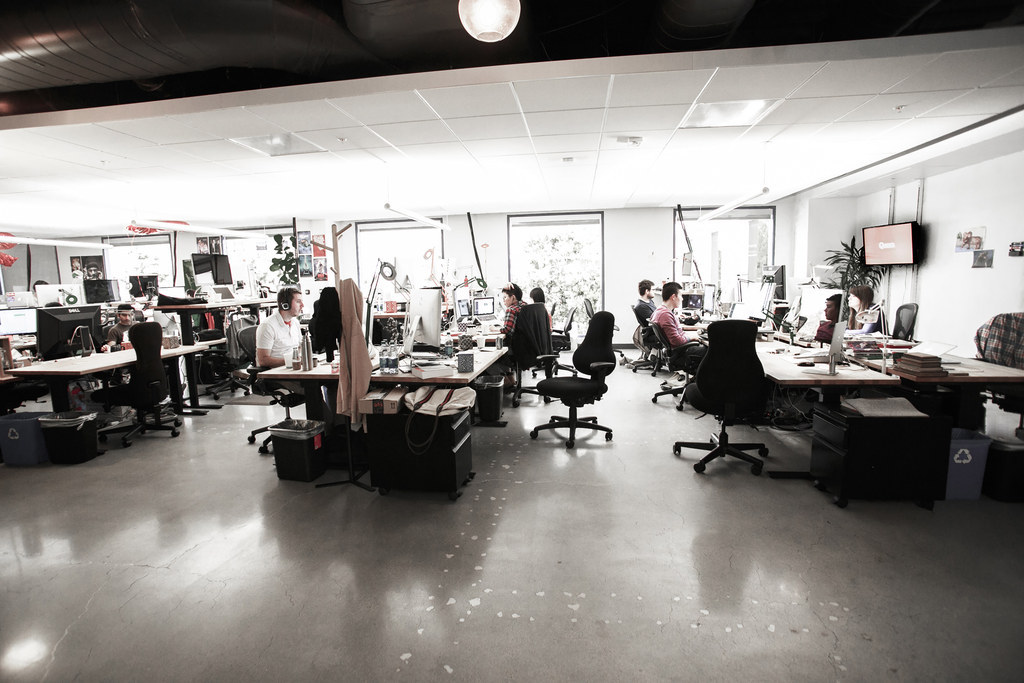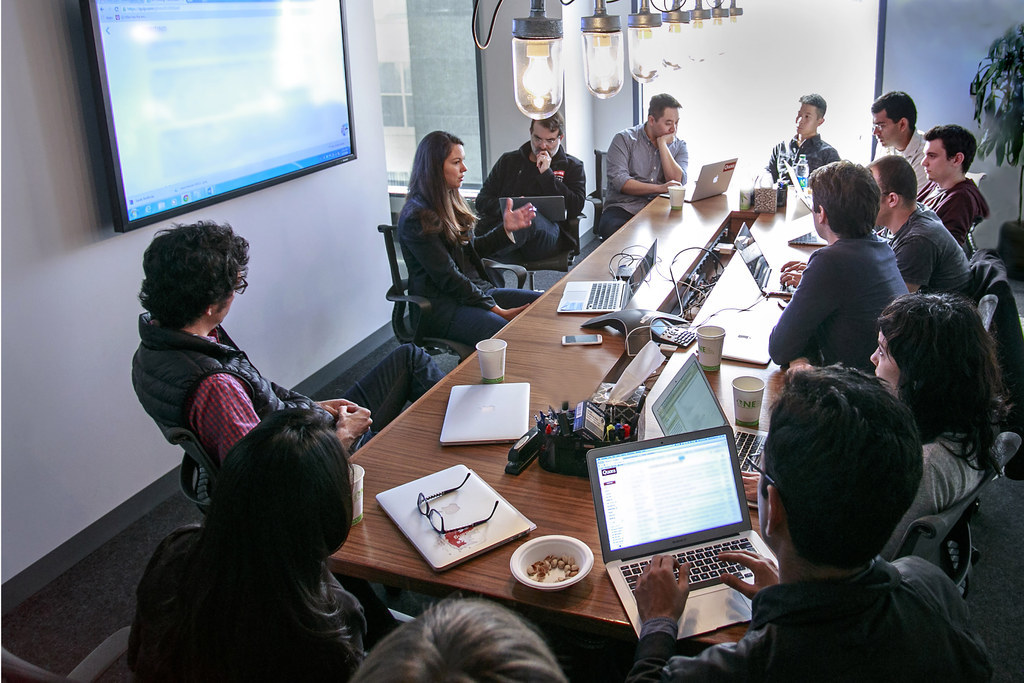
In the past couple of years, how have you seen the way people communicate on the Internet change over time?
Adam D'Angelo: Things are getting more verticalized. In the past people used to set up their own website, and there were lots of different platforms. You could use lots of different software to make a website, every website looked different. Now, there's a lot more centralization, so instead of your homepage, you have your Facebook page, your Twitter account, and everyone uses the same service; they use Facebook and they use Twitter. Whereas in the past, everyone had a different homepage, and every homepage would be different.
So stuff's just getting centralized onto a smaller number of platforms. And then the platforms get really good with the scale they get to. Because one person can't really invest in good technology just for their one site, there's just one person, but when you have everything centralized, like Quora we can hire this team of 100 really amazing people to build Quora into a great product, because it's centralized. That's an important thing.
Another trend going on is, if you look at what's happening with messaging apps... it's almost like specialization happening. In different countries there are these different apps that get really popular, and they're kind of culturally tuned to the place.
Like WeChat and Line.
AD: Yeah, but even in Korea there's KakaoTalk, there's Telegram, that's another messenger. That gets customized for these different countries. If you look online, or on some of the messaging apps, they show a different set of stickers depending on what country you're in. They specialize it for you. Quora is very different from these apps, but... I think that no one has come along and really done stickers well for the Western market.
In 2007, I was at Facebook and we looked at some of the social networks in Asia, and they were full of games. There was this farm game that was integrated with the biggest social network. And people would spend money on these virtual gifts to give each other, and buy stuff for their farm. And it just seemed crazy — no way would people in the U.S. go for this kind of thing. They're just too serious. And then you open up Facebook platform and a year later, games are everywhere, FarmVille's there. I always hesitate before drawing these cultural conclusions that people are that different in other places. Culture really matters. I wouldn't be surprised if stickers are as big here as they are in Asia in five more years.
Can you articulate what the core problem Quora is trying to solve, on a technical and more general level, and how far along the company is?
AD: There's actually a lot of problems that all fit together. We're trying to keep quality high, that's very important for us. If you look at all these other efforts before Quora, to get knowledge onto the internet, a lot of them suffered from quality [issues]. That's a big problem. We need to build systems that can automatically figure out what's high quality and what's not, and encourage users to contribute high-quality content. There's a lot of technical challenges in that.
We're basically building this map of who the experts are in every given topic of knowledge. For any area of knowledge, we want to know who the people who know the most about that are, and should be answering questions, so when we have questions we can show them to the right people. So it's this technical challenge around building out this map of areas of knowledge, and this database of who the experts are and automatically updating that over time.

When people in Silicon Valley talk about discovery, there tends to be a lot of hand-waving. Depending on who you talk to it's a really hard technical or a really hard user experience problem. How do you guys think about it? Have we gotten pretty good at it or do we suck at it?
AD: For us it's user experience and technology; they work together. We need good user experience to get people to tell us what they're interested in and who their friends are, and to explain to them why we're showing certain content. We need good technology to predict what content is the most relevant. No one's gonna sit there and spend hours marking exactly what they want. Netflix used to rely very heavily on star ratings, which was a lot of work for users. Now it just learns automatically based on what you click on. There's this trade-off where you can't have the user do too much stuff and infer based on what they did do what else they might be interested in.
I think we're a long way away [in having a good solution to discovery]. If you imagine your friend is recommending you content on a topic they're an expert on, they can do a really good job of that. They know what you're interested in, they know your personality, they know if you have a scientific type of mind-set or not. Do you like highbrow or lowbrow. There's a hundred different dimensions that you could map someone on.
Most of the software you're using today, these sites that do discovery, they don't have any of that information, like whether you like stuff that's funny or not. There's not a lot of data shared between different services. You can go to Pinterest and they'll get to know who your friends are, but they don't get to know very much about what you've done in the past. They're starting with little information about you and they have to do this personalization. For discovery to get to 100, if we're on a scale from 0 to 100, there's gonna need to be some way for this software to learn more about you. Either by asking you questions or learning from your behavior.
If someone could make it where there's a standard where you publicly declare what you like not in a privacy-violating way, and you could share that to different services, that would be an important step toward getting to 100.
Is that why you guys use Facebook as part of login?
AD: We use that to get your friends. That's important; I wouldn't say that's necessarily the same as discovery, but people generally like to read the stuff their friends have written, because they're their friends and they like to answer their friends' questions. So Facebook helps with that. That's kind of the social graph, which is one small part of discovery.
What are some things you personally want to imbue in the company as it continues to grow?
AD: Then there's principles we have for the company, we want people to be direct to each other and respectful of each other. We want to have a good environment for people to work together and collaborate. We want to make sure that the product comes first. If there's something that's gonna be a little uncomfortable internally to make some change, or hard to do, we always go through the lens of what's gonna be best for the product.
I think sometimes when companies get big, they can lose sight of the goal or reason they exist. Especially when they have a lot of funding or resources to not be held accountable to the market every quarter. If you're in engineering you make some trade-off that's gonna make it really elegant in terms of the code, but it's confusing for the user. Or if you're in design, it's like, this is something that will get me respect from the design community, but it's weird for normal people. There are products out there where you can look at it, that's like someone had fun making that, but it's not gonna get to be something the whole world uses because it's too idiosyncratic. We want to focus on what's gonna get the most knowledge shared in the world.
What are some cool things we're going to see happening to the internet in the next few years?
AD: I think machine translation is going to continue to get better. Like, automatically translating from English to French. Right now you can use Google Translate — it's better than nothing. It's still pretty bad compared to what a human can do, but it's getting to be more and more passable. There's some breakthroughs recently that are gonna accelerate that further.
[Another one], personalization is moving into more and more areas. Stitchfix, it's this clothing service, it's basically like personalized shopping for you over the internet. It's just an area where you might have never thought personalization technology is gonna be really important, but actually it works really well and the company is doing really well. You can almost take any industry and apply personalization and get a totally interesting new product. Amazon's been doing this for a very long time. These industries that would have had nothing to do with technology [are now being augmented by personalization].

Why are we only now getting to a point where personalization is a good tool for all these companies?
AD: Part of it is, you need a lot of data. We're only now at the scale where there's enough users. If you launch something like Stitchfix in 2002, there just aren't that many people using the internet. Not many people were comfortable buying things online. So much was still happening in stores, so you can only get a tenth of as many people using it back then as you can now. With a tenth of as many people you would have a tenth as many data points to train your machine learning.
So then, it just works a lot worse. Everyone now just has much more data than they used to have, that makes personalization a lot easier. Also the technology is just getting progressively better. There's these research breakthroughs, but also the quality of the open source software you can just download and use is just getting better. Now you learn it in college; it's getting more dispersed.
Like machine learning?
AD: Yeah.
The other thing is, [personalization] is hard. There were just a lot of things to do before that weren't as hard where you could have a huge business if you just set it up. I think Twitter doesn't do very much machine learning, but it's kind of personalized because you choose who you follow. It's just easier to build Twitter than to build some really complicated machine learning system. The easy stuff had to be done first. Now that's done, now we can all build on top of that and move on with the harder problems.
Sometimes there's resistance to it. If you look at Twitter, it sounds like they want to customize the ranking of people's feeds, and it's, like, this really controversial thing. Everyone really wants it in time order, or some people do and they're really adamant about it. I think, there's value in having it predictable and timely for users, but I just think it's the right choice for them to have some algorithm there. But it's hard for them to switch; you almost need totally new companies to grow up.
You could say, Wikipedia has no personalization at all, but if you're gonna build a knowledge sharing system with personalization — I don't think we compete directly with Wikipedia, but it's just a different paradigm you build the whole company around. It's really hard to say, Wikipedia, add personalization. Nothing has been built for that; the contributors wouldn't like it. It's easier to start over and build something new. You can see Twitter wrestling with this now to roll out an algorithmic feed, and hopefully we'll get to it. But it seems like it's taken years.
What would you say the impact of the iPhone was for the internet in general?
AD: For the industry in general, the phone is, it's scale. It means there's a lot more people who can use these products, it means there's a lot more hours per day that people can use the internet instead of TV or whatever it's cutting into. It's not just that you have triple the minutes, with the scale you suddenly can support all these things you never would have had before.
Companies that wouldn't have been profitable are now profitable. The effects of scale are so good for the internet; you have computers and you write your software once and you can have 10 times as many users, it doesn't mean you have to do 10 times as much work. If you have 10 times as many users, you can make 10 times as much revenue, then you can support 10 times as many people building your product. So you can make a much better product than you would have otherwise been able to build.

Do you think there's will be cultural barriers to get people using something like Quora internationally?
AD: We're integrated with Facebook here, If we want to go into Asia it'll be important to integrate with the Asian social networks.
I don't think there will be a cultural clash. I think knowledge is fundamental to human nature, and I think everyone has questions. Everyone has knowledge they can share, I don't think there will be too many fundamental barriers. In some countries I expect it might work better than english.
Such as...
AD: This is just a guess, but I've just heard from people who've run other similar products — German Wikipedia is really strong. Somehow the culture there, people like contributing — maybe they have a lot of free time, I don't know whatever it is — but these kinds of products do well in German.
But we'll see, that's just a guess.
What are the big problems that are getting you excited these days?
AD: The biggest thing for us is just scale, aside from internationalization. We're getting more questions, more answers every day, so we have to match them better with people. We get better at this matching, and we get people to contribute more content than they used to.
And that's an interesting engineering problem.
AD: Yeah, it's a lot of statistics and math, and there's a lot of creativity that goes into the ranking of predicting what someone's gonna answer.
So that helps keep engineers from leaving to join other tech companies?
AD: We don't usually have to worry about poaching. It's because a lot of times we have genuinely interesting problems to work on. It's much easier to motivate the best people if you have the most interesting work for them to do.
I think the other thing is getting to be more mass audience. We're making the product easier and easier to use and getting bigger and bigger. Then that motivates writers, because they can get to a bigger audience.
Quora started as a pretty niche service focused on Silicon Valley and was sort of known for that, but as it's grown into other topics, what spurs that growth? What spawns a new topic on Quora?
AD: The fundamental property is that the same person usually knows about a bunch of different topics. Maybe you originally joined Quora because the math content was good, but someone else can come along and ask a question about San Francisco, and then you're there. Because people know about lots of different areas of knowledge, it does end up with this natural diffusion process. At this point a very small percentage of Quora is Silicon Valley, and I think it can still spread much further, but it's pretty diversified.
How do you ensure a company like Quora becomes a lasting iconic technology company much in the way Facebook appears to have transformed into?
AD: We absolutely want to get to be as big as possible and have as much of an impact as possible. I think, one example I have is Wikipedia. I think I'd be happy if we made the level of impact that Wikipedia has made on the internet, which I think is really big. I think, looking further out if you got to the point where most of the knowledge you wanted was on Quora, or if we could double the amount of knowledge available to people on the internet, that would be a really good outcome to me. I don't know if we're gonna branch into lots of other different products, but there's just so much knowledge out there that's not available to people, that that goal can keep us busy for a long time.
Did that require a different mind-set than when building Facebook originally?
AD: It wasn't really compared to Facebook, but compared to the other knowledge-sharing products that were out there. We want to focus on quality, we want to be the best place for people to go when they actually have a question. It would sound like everyone would want quality, but if you looked at 2009 and looked at all the other services like this — like forums or other Q&A products — they all ended up really low quality as they get to be popular. Quality was the number one principle.
Another principle we have is permanence, we want Quora as a company to last forever, we want the content to last forever. You have to have one version of each question. As someone writing an answer on Quora, if you write the best answer, it's going to be the definitive answer on the internet for anyone who has that question, for years. That's important for motivating quality, but it's also good for the world to have this kind of permanent database of knowledge.

In terms of just Quora, what are the steps along the way to ensuring there's business that continues to grow?
AD: I think we're very lucky that we have a user intent. Someone has a particular question, they're trying to get the answer, someone's looking for how to solve some issue. Then, we're providing answers. Services that have a lot of intent actually end up monetizing really well. Google search, Yelp, TripAdvisor, GlassDoor: These services where you build up a lot of content and people are using it to help inform them about whatever.
There's different ways, exactly, how to make a business about that. There's different ways we can go. We can show ads like Google does, we can have sponsored answers or let people pay for more distribution for their content. There's a lot of people who would like to pay to get other information in front of them. But fundamentally users are using Quora to figure things out and to get answers and to learn. A lot of time that information that someone wants to pay to get in front of them is information that would actually help them.
This thing where you have to stick a cog in the middle of the gears to do what you need, that's unlikely to happen for us just because of the space we're in. Whereas I think the other extreme of this is, social networks, people are there to hang out with their friends. You don't want to see ads, they aren't compatible and it's a distraction, and it's OK. It still works, they make a lot of money. On Google, people don't get as annoying with the ads. The ads have a similar goal to what you have, you're trying to figure something out, the ads are there to suggest other similar things you might want to see in the process of figuring it out.
As the number of people connected to the internet grows, what are the consequences of that?
AD: It's good for these populations that would have never had internet access before. They can now have access to knowledge about anything; that's Wikipedia and Quora in the future as we get into other languages.
That changes how people work. People can choose a better job because they have access to figure out what's a good industry to go work in. They can stay in touch with people they trust in other areas of the world. It's just unifying the world, bringing everyone closer together in terms of ... everyone's able to benefit from everyone else in a way that just wasn't really possible in the past.
What are some last frontiers of the internet that we haven't quite gotten to?
AD: Machine translation is one of these things, if people in other languages could read all the english content naturally, it would be this huge change for the whole internet. I think another thing is video. There's YouTube and there's Instagram and there's video on Facebook, but there should be a lot more video and it should be used in all these different ways.
What's particularly interesting to you?
AD: The stuff that's really interesting to me is the [artificial intelligence]. There's a lot of progress being made in getting better at understanding text automatically, understanding images, understanding video. A lot of this applies to personalization, to other problems that are important for us.
What does that enable?
AD: It would enable us to automatically send a new question to the best person in the world to answer that question. They write the answer, and we automatically know who should read this answer, probably these 10,000 people, and we send it out to them. All of that could happen instantly if we have this good ability to read the text and understand what it's about and what it means.
Does that change the way the broader internet work?
AD: At some point software can read the papers and the content on the Internet and synthesize it in new ways. That's even further away. Basically personalization gets better, but it's especially important for us being able to take a question and automatically know who's gonna know the answer. I can do this as a person, if someone comes to me with a question, I know 500 people, and I can say of those 500 people who is the best, and I'm gonna ask them. It's still very hard for software to look at a question and say what it means and this kind of person would know the answer.
